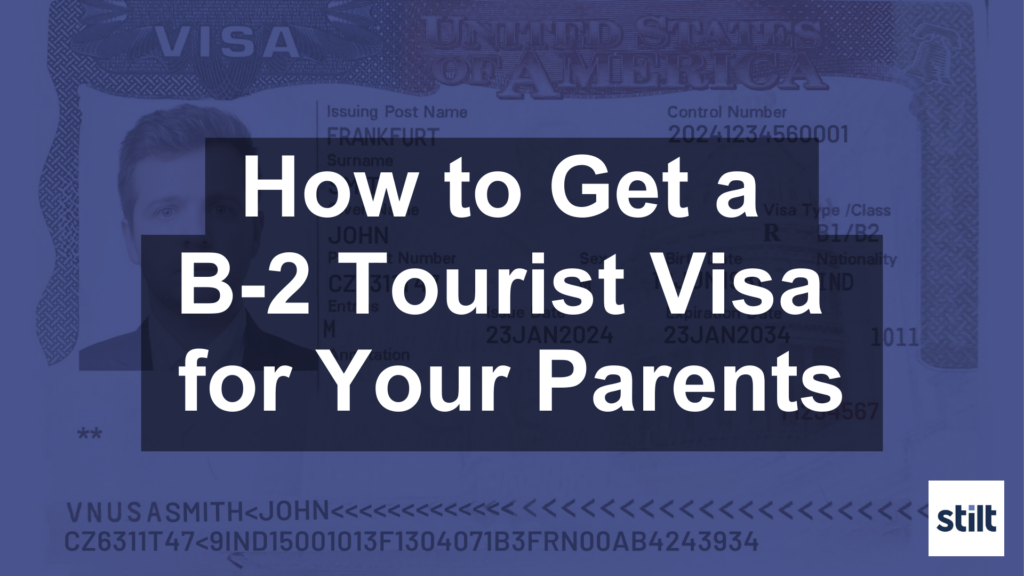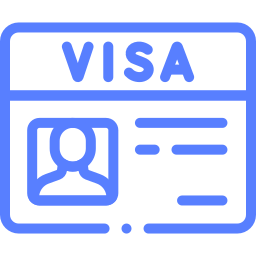I’m a firm believer that information is the key to financial freedom. On the Stilt Blog, I write about the complex topics — like finance, immigration, and technology — to help immigrants make the most of their lives in the U.S. Our content and brand have been featured in Forbes, TechCrunch, VentureBeat, and more.
See all posts Frank GogolHow to Get a B-2 Tourist Visa for Your Parents

Applying for a B-2 tourist visa for your parents to visit the United States involves several key steps and requires careful preparation of documentation and understanding of the process. Here’s a detailed guide to help you through this process:
At a Glance
- Complete the DS-160 form online for each parent applying for a B-2 visa.
- Pay a $185 non-refundable fee for each application.
- Schedule an interview at a U.S. Embassy or consulate and gather necessary documents.
- Attend the interview, and visa processing time may vary post-interview.
B-2 Visa Eligibility for Parents
Firstly, your parents must meet the eligibility requirements for a B-2 tourist visa. This involves demonstrating strong ties to their home country, showing that they intend to return after their visit to the U.S.. Note that it’s not possible to “sponsor” a family member for a temporary tourist visa; each applicant must apply individually.
How to Apply for a B-2 Visa for Parents
Applying for a B-2 tourist visa for your parents to visit the United States involves several steps:
1. Completing the Visa Application
The application process starts with completing the online Form DS-160, which collects biographical information, travel plans, and other relevant details. Each parent must fill out a separate DS-160 form.
2. Paying the Visa Application Fee
There’s a non-refundable visa application fee of $185 for a B-2 visa. Payment methods vary, but most U.S. Embassies and Consulates accept online payments. It’s important to print the receipt as proof of payment.
3. Scheduling the Visa Interview
After filing the DS-160 forms, your parents need to schedule visa appointments at the U.S. Embassy or consulate in their home country. This can often be done online or by phone, and requires their passport number, DS-160 confirmation number, and the payment receipt.
4. Gathering Supporting Documents
Your parents should gather several documents for the visa interview, including their passports, recent color photographs, evidence of strong ties to their home country (like proof of employment, property ownership, and family connections), travel itinerary, and an optional invitation letter from you. For exhaustive lists of the required documents for parents and sponsors, check out this guide.
5. Attending the Visa Interview
The visa interview is a crucial step. It usually lasts about 15 minutes, where a consular officer will ask questions about travel plans, ties to the home country, and other relevant topics. It’s important for your parents to answer truthfully and provide any requested documents.
Check out our Guide to the B-2 Visa Interview Questions!
Receiving a Decision
After the interview, your parents will be informed of the decision. If the visa is approved, they will need to wait for their visa to be processed, which can take from a few days to several weeks. They should not make any travel arrangements until they receive their official B-2 visa.
Preparing for Travel
Once the visa is approved, you can help your parents prepare for their trip to the U.S. This includes gathering necessary documents like travel insurance and making travel arrangements. Familiarizing them with U.S. airport requirements and customs procedures is also advisable.
Considerations for Parents of F-1/J-1 Visa Holders
If you’re an F-1 student or J-1 exchange visitor inviting parents, additional documentation is recommended to strengthen the visa application. This includes:
- proof of employment
- property ownership
- financial assets
- family contacts in your home country
A formal letter of invitation indicating the specific reason for their visit, like attending a graduation ceremony, can also be helpful.
Read Next
Final Thoughts
Applying for a B-2 visa requires detailed planning and preparation. Ensuring all documents are in order, preparing for the interview, and understanding the process will significantly increase the chances of a successful application. Remember, the key is to demonstrate the temporary nature of the visit and strong ties to the home country.
Frequently Asked Questions (FAQ)
What is a B-2 visitor visa?
A B-2 visitor visa is a non-immigrant visa for persons wanting to enter the United States temporarily for tourism, pleasure, or visiting family members.
Who needs a B-2 visa?
Generally, citizens of countries not part of the Visa Waiver Program require a B-2 visa for leisure visits, including parents of U.S. residents or citizens.
How do I start the B-2 visa application process for my parents?
Begin by having each parent complete the online DS-160 form, the standard application for non-immigrant visas.
Is there an application fee for the B-2 visa?
Yes, there is a non-refundable application fee of $185 for each B-2 visa application.
What documents do my parents need for the visa application?
Required documents typically include valid passports, recent photographs, evidence of strong ties to their home country (like employment or property ownership), a travel itinerary, and an optional invitation letter.
How is the visa interview scheduled?
After submitting the DS-160 form and paying the fee, your parents must schedule an interview at the nearest U.S. Embassy or consulate.
What happens during the visa interview?
During the interview, a consular officer will ask questions about the travel plans, reasons for visiting, and ties to the home country to assess eligibility.
How long does it take to get a visa decision?
The processing time varies, but typically, applicants will receive a decision within a few days to several weeks after the interview.
What should my parents do after receiving their B-2 visas?
They should prepare for travel by arranging transportation, accommodation, and ensuring they have all necessary documents for their stay in the U.S.





